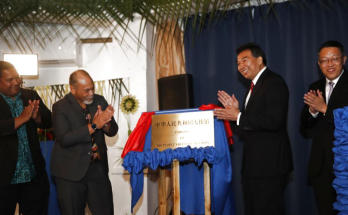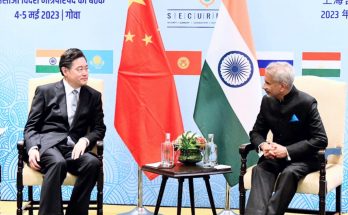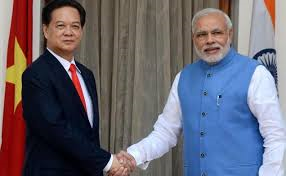 Amid China’s hardening posture on the South China Sea ruling by an international tribunal, senior officials of India and Vietnam have held strategic talks in New Delhi to bolster their military and economic relations, which could pave the way for a visit by Prime Minister Narendra Modi to Hanoi early next month.
Amid China’s hardening posture on the South China Sea ruling by an international tribunal, senior officials of India and Vietnam have held strategic talks in New Delhi to bolster their military and economic relations, which could pave the way for a visit by Prime Minister Narendra Modi to Hanoi early next month.
The 8th Foreign Office Consultations (FOC) and 5th Strategic Dialogue between India and Vietnam were held in New Delhi on August 2. The Indian side was led by Preeti Saran, Secretary (East) in India’s Ministry of External Affairs, and the Vietnamese side was led by Vice Foreign Minister Vũ Hồng Nam.
Bonding over South China Sea
The volatile situation around the South China Sea in the wake of The Hague tribunal’s ruling rejecting Beijing’s “historic claims” over the disputed water body and the so-called nine-dash line figured prominently in discussions.
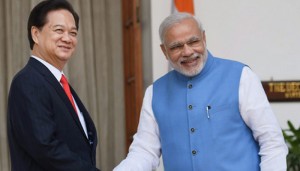 The discussions in New Delhi saw a striking convergence of perspectives between the two countries on the South China Sea issue. “Both sides also discussed recent developments in the maritime domain and the need for peaceful resolution of all disputes in accordance with accepted principles of international law as reflected notably in the United Nations’ Convention on the Law of the Sea (UNCLOS) 1982,” said a statement by India’s external affairs ministry.
The discussions in New Delhi saw a striking convergence of perspectives between the two countries on the South China Sea issue. “Both sides also discussed recent developments in the maritime domain and the need for peaceful resolution of all disputes in accordance with accepted principles of international law as reflected notably in the United Nations’ Convention on the Law of the Sea (UNCLOS) 1982,” said a statement by India’s external affairs ministry.
The Vietnamese side also reaffirmed its support for India’s candidature for a Permanent seat in an expanded UN Security Council, a clear signal of Hanoi’s strategic intent to deepen relations with India which it sees as a balancing power in the region.
Modi’s visit to Vietnam
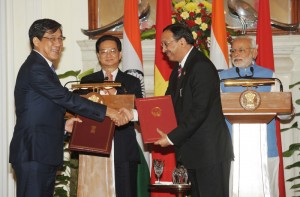
The recent talks in New Delhi have set the stage for a visit by Prime Minister Narendra Modi to Hanoi early September. There is no official statement yet, but reliable sources said that Mr Modi could visit Vietnam after attending the G20 summit in the Chinese city of Hanzhou on September 4-5.
The visit to Hanoi will take place at a time when the India-China relations are under strain following China’s stalling of India’s bid for the NSG membership and India denying extension of visas to three Chinese journalists working for state-run Xinhua news agency. Mr Modi’s visit to Hanoi, as and when it happens, will be closely watched in Beijing, which has resented growing proximity between New Delhi and Hanoi, and sees India as engaged in a containment game with the US, Japan, Australia and friendly ASEAN countries. India has many a time repudiated containment conspiracy theories drummed up routinely in the influential state-directed Chinese media outlets. But at the same time, it’s building a network of relationships in the region to act as checks against China’s potential military adventurism. In this calculus, Hanoi as emerged as a crucial lynchpin of the Modi government’s rechristened Act East policy.
South China Sea geopolitics
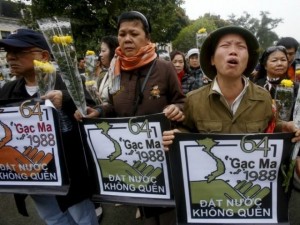 The South China Sea, post Hague tribunal verdict, has become an arena of intense diplomatic manouevering in the region. China has rejected the ruling by the Permanent Court of Arbitration in The Hague and has asserted that it will continue to protect its core sovereignty interests in the South China Sea and has resorted to military drills to send the message across.
The South China Sea, post Hague tribunal verdict, has become an arena of intense diplomatic manouevering in the region. China has rejected the ruling by the Permanent Court of Arbitration in The Hague and has asserted that it will continue to protect its core sovereignty interests in the South China Sea and has resorted to military drills to send the message across.
India has urged China to show “utmost respect” for the tribunal’s ruling and has reiterated the need for upholding freedom of navigation and resolution of all maritime disputes in accordance with the United Nations’ Convention on the Law of the Sea (UNCLOS). Vietnam, which also claims parts of the South China Sea and has been locked in a stand-off with China over the latter’s building of artificial islands in the contested water body, has greeted the tribunal’s verdict.
Vietnam’s Communist Party leaders are under mounting pressure to press for its claims over the Spratlys and the Paracels under the 1982 United Nations Convention of the Law of the Sea (UNCLOS). Speculation is rife that Vietnam may follow the suit of the Philippines and take China to the international court.
India-Vietnam defence ties
Against this backdrop, India and Vietnam are looking to enhance consultations on regional issues and planning to upgrade their military and strategic ties. India has decided to set up a satellite tracking and imaging centre in southern Vietnam that will give Hanoi access to pictures from Indian earth observation satellites. Significantly, the satellite station would cover China and the South China Sea as well.
What’s worrying for China is increased defense collaboration between India and Vietnam. Many ambitious plans have been firmed up, which include the sale of military equipment, sharing of intelligence, joint naval exercises and training to counter insurgency and jungle warfare.
India’s Balancing Power
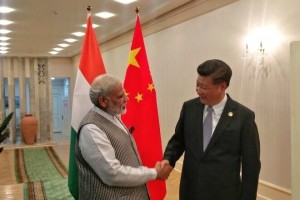 The Modi government is ready to push the envelope further and is understood to have cleared the sale of BrahMos missiles to Vietnam, a more realistic possibility after the induction of India into the Missile Technology Control Regime (MTCR). India is also planning to upgrade and modernise defence platforms in Vietnam. India has provided a concessional line of credit for $100 million to Vietnam to procure offshore vessels and defence equipment.
The Modi government is ready to push the envelope further and is understood to have cleared the sale of BrahMos missiles to Vietnam, a more realistic possibility after the induction of India into the Missile Technology Control Regime (MTCR). India is also planning to upgrade and modernise defence platforms in Vietnam. India has provided a concessional line of credit for $100 million to Vietnam to procure offshore vessels and defence equipment.
This systematic and consistent effort by India to bolster defence capabilities of Vietnam underlines New Delhi’s growing investment in a crucial relationship with an emerging ASEAN country, which will enhance its profile as a net security provider and a balancer in the region. The visit by PM Modi to Vietnam is, therefore, going to be tracked closely by the powers-that-be in Beijing and will have ramifications for peace and stability in the extended East Asia region.
Author Profile

- Manish Chand is Founder-CEO and Editor-in-Chief of India Writes Network (www.indiawrites.org) and India and World, a pioneering magazine focused on international affairs. He is CEO/Director of TGII Media Private Limited, an India-based media, publishing, research and consultancy company.
Latest entries
 India and the WorldMarch 3, 2024India-Denmark Connect: Red carpet for Indians to Red Sea cooperation
India and the WorldMarch 3, 2024India-Denmark Connect: Red carpet for Indians to Red Sea cooperation India and the WorldFebruary 17, 2024Munich Security Conference: Jaishankar, Blinken focus on Red Sea, Middle East
India and the WorldFebruary 17, 2024Munich Security Conference: Jaishankar, Blinken focus on Red Sea, Middle East India and the WorldFebruary 14, 2024Munich Security Conference report: Migration, war top security threats
India and the WorldFebruary 14, 2024Munich Security Conference report: Migration, war top security threats India and the WorldJanuary 23, 2024With “Ram to Rashtra” mantra, Modi consecrates Ram temple for national renewal
India and the WorldJanuary 23, 2024With “Ram to Rashtra” mantra, Modi consecrates Ram temple for national renewal





